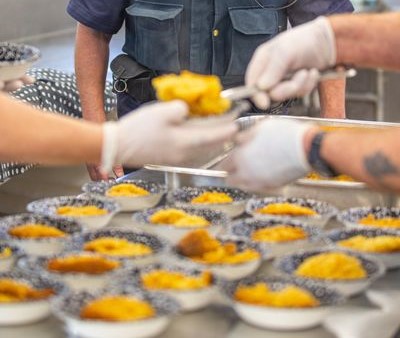8 September 2023
What does it take to run a kitchen inside a prison?

If you’ve ever wondered what’s involved with preparing meals for everyone in a prison, Gareth, a catering instructor based at Invercargill Prison has some insights to share.
He’s been working for Corrections for 5 years, with 3 years as an instructor passing his skills in the kitchen on to people in prison, plus preparing meals for the site. Invercargill Prison has around 150 people, so Gareth and his team make roughly 450 meals a day.
With a background in music, sales and hospitality, it wasn’t a direct journey for Gareth to catering instructor – but it was one that allowed him to develop different skills for the role.
“Working in sales gave me experience in management and working with people. I also had a bit of work experience working in a kitchen – starting out washing dishes, then progressing to preparing meals.”
Gareth initially joined the organisation as a Corrections Officer, which helped him to also develop skills in the custodial space. When the instructor role was advertised, he had heard good things about the position and decided to go for it.
His role involves both running the kitchen and ensuring meals are completed for the site, as well as helping the men to develop their skills and work towards a qualification that they can use when they are released.
“Generally, we’ll start the day with a bit of a chat on how we’ll approach the work. We have a national menu that we need to abide by but there’s a bit of opportunity for creativity in how the men approach the task.
For example, men can choose the sides and how they want to approach them. We have a haul of fresh vegetables, which ones do we want to prepare for tonight? And how do we want to prepare them? Do we want to roast them, or pour garlic butter over them? As long as there’s a variety throughout the week and it fits inside the nutritional guidelines, it’s up to them.”
The other aspect to the role is helping the men achieve qualifications. Gareth says that those that are working towards a qualification are provided with resources to help guide them in what they need to do to reach certain assessment standards.
“We work alongside them as they complete the unit standards, as instructed in the book, and assess them at the same time.”
He says that the experience of working together on something helps to create a good relationship with those that they manage - one that generally has respect on both sides.
“Safety and security for both staff and other prisoners is always really important, but there are also other goals when you’re an instructor – working together with a common goal, creating something – which helps to create a good environment.”
Sometimes there are situations that he needs to manage, including ebbs and flows in motivation among the men, but overall he’s found the kitchen is treated positively. It’s a real opportunity to get out of the unit and do something different.
Collaborating with colleagues and the community
Providing meals for a prison isn’t something you can do alone, and Gareth says that he works with other staff members across the prison to help keep things running smoothly.
“We’re always working closely with staff across the site as we’re procuring ingredients, kitchen equipment, trays, etc.
We also work closely with the receiving office to get information on new offenders coming through - where their meals need to go and any dietary requirements. Same with the medical staff if there’s conditions that might affect the food they can eat.”
There are also jobs from outside the wire to work on. This could include catering for Community Corrections, or from time to time, jobs for external organisations. For example, a highlight for Gareth was having the opportunity to cater for about 80 people attending a nurses award ceremony.
“It was great for the guys to have the opportunity to do a big catering job and to know that it is contributing to the community.”
Advice for others
Gareth says that “treating people the way you want to be treated” and being willing to share your knowledge are two of the keys to being a good instructor.
“It’s about treating someone as a person. And if someone asks a question, sharing your knowledge with them.
Even if it’s not necessarily to do with catering – like for me, if someone asks me a question about music, I’ll share what I know. It all comes back to building that rapport.”
Reflecting that rapport building, he recalls running into someone he used to mentor in the kitchen on the outside and learning that the man has found employment in the food industry.
“My main advice for people interested in this as a career path is don’t devalue your skills and experience. There’s such a broad range of industries where your skills could be relevant – laundries, hospitality, horticulture, farming, engineering, construction, carpentry… the list goes on.”
Ready to make a move?
Start your journey - check out the a list of our current opportunities then apply online today!